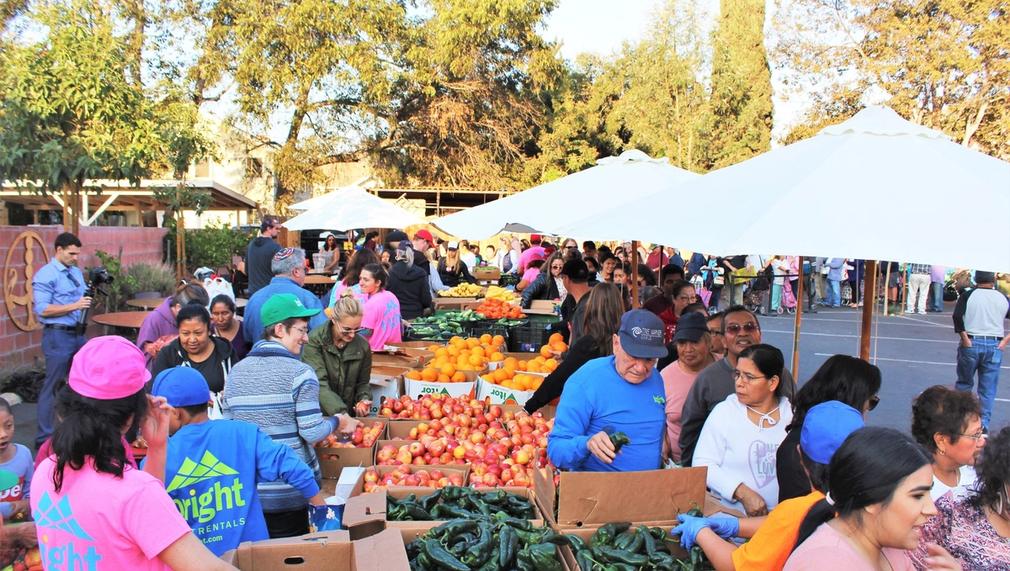Food as Medicine Nutrition & Health Clinic
Seeds of Hope seeks to address and prevent chronic, food related diseases by creating and expanding our free produce markets at select sites within LA County. In conjunction with these markets, Seeds of Hope will employ community health workers and work with partners to offer wraparound services related to health, wellness, access to social services and affordable housing. Seeds of Hope is calling this initiative the Food as Medicine Nutrition and Health Clinic.

What is the primary issue area that your application will impact?
Food insecurity and access to basic needs
In what stage of innovation is this project, program, or initiative?
Pilot or new project, program, or initiative (testing or implementing a new idea)
What is your understanding of the issue that you are seeking to address?
Seeds of Hope has a vast network of food recovery and urban agriculture partners ranging from senior housing through LGBTQ+ community resource sites to community-based organizations, and city parks in over 100 communities across six Southern California counties, reaching over 25,000 food insecure individuals. Thanks to the diversity of its communities served, Seeds of Hope has gained insight into the multifold challenges that community members face on a daily basis, of which food insecurity is only a part. Individuals and families are rarely afflicted by one type of insecurity: food insecure individuals are also more likely to face housing and income insecurity and have undiagnosed or untreated medical or mental health conditions. It is this intersectional complex of issues that Seeds of Hope is seeking to address with the Food as Medicine Nutrition & Health Clinic, providing a holistic approach to services, and creating a “one stop shop” for individuals and families experiencing need.
Describe the project, program, or initiative this grant will support to address the issue.
Starting in August, Seeds of Hope will enter into partnership with MediCal, the California implementation of the federal Medicaid program, enabling it to offer and bill for medical services through the state program. In order to leverage its status as a MediCal partner and better serve its communities, Seeds of Hope is seeking funds to hire and train two health care providers: a clinical social worker and a licensed vocational nurse. These two part-time positions will be the foundation of a pilot program based out of Seeds of Hope headquarters at St. Paul’s Commons in Echo Park with auxiliary sites at the Pico-Union Project and St. Barnabas Episcopal Church in Eagle Rock, three of Seeds of Hope’s largest distribution sites with a combined total of 1,000 families attending weekly. By onboarding a clinical social worker and licensed vocational nurse, Seeds of Hope will be able to consistently offer a wide array of services beyond its produce distributions, nutrition education and CalFresh enrollment, including housing assistance, preventive health screenings and basic healthcare, mental health services and more to the communities it already supports and beyond. The success of the pilot program will allow for an expansion beyond the three initial sites to Seeds of Hope’s monthly distribution sites as well as the establishment of a separate, self-governing social services department within the organization that can function independently of distribution sites.
Describe how Los Angeles County will be different if your work is successful.
Residents of Los Angeles County will have reliable, consistent access to concrete, material resources to address the most pressing needs underserved populations currently face in the region: food insecurity, housing insecurity, and a lack of medical and mental health services. The success of this program is better ensured by building on Seeds of Hope’s existing infrastructure in addressing food insecurity across Los Angeles County and beyond. The relationships and connections with partner sites will ensure ready access to individuals and families experiencing need in some of the county’s most underserved areas, thereby circumventing the challenge of having to seek out individual services at often considerably distant locations. By expanding the services offered at its produce distribution sites, Seeds of Hope will be able to maximize the impact of its infrastructure and programming while also eliminating barriers to services for its clients.
What evidence do you have that this project, program, or initiative is or will be successful, and how will you define and measure success?
The success of this program will be measured through two main metrics: number of individuals reached, and self-reported changes in circumstances. The first metric will break down into the total number of individuals to ever receive services, the number of individuals to complete treatment plans and the household size of service recipients. The second metric will break down into surveys inquiring about any changes in the housing status, health and wellness, food security, mental health state, access to resources and overall satisfaction of service recipients. The combination of these metrics will give a good representation of the structural capacity of the pilot project, the strengths and areas for growth of new services being offered and any changes and additional resources required for continued program development.
Approximately how many people will be impacted by this project, program, or initiative?
Direct Impact: 20,000.0
Indirect Impact: 60,000.0